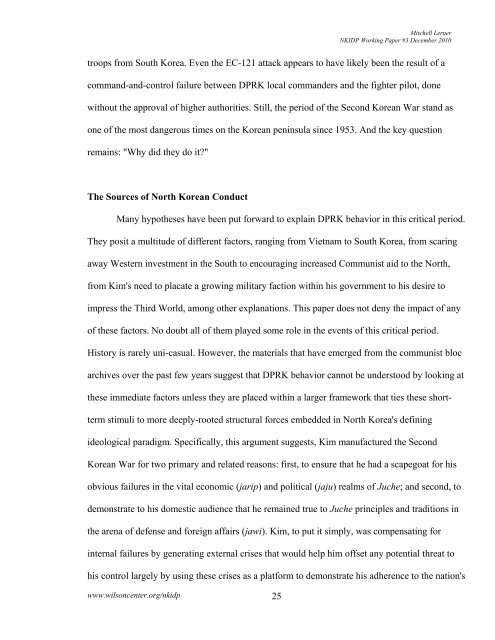"Mostly Propaganda in Nature:" Kim Il Sung, the Juche Ideology, and ...
"Mostly Propaganda in Nature:" Kim Il Sung, the Juche Ideology, and ...
"Mostly Propaganda in Nature:" Kim Il Sung, the Juche Ideology, and ...
Create successful ePaper yourself
Turn your PDF publications into a flip-book with our unique Google optimized e-Paper software.
Mitchell Lerner<br />
NKIDP Work<strong>in</strong>g Paper #3 December 2010<br />
troops from South Korea. Even <strong>the</strong> EC-121 attack appears to have likely been <strong>the</strong> result of a<br />
comm<strong>and</strong>-<strong>and</strong>-control failure between DPRK local comm<strong>and</strong>ers <strong>and</strong> <strong>the</strong> fighter pilot, done<br />
without <strong>the</strong> approval of higher authorities. Still, <strong>the</strong> period of <strong>the</strong> Second Korean War st<strong>and</strong> as<br />
one of <strong>the</strong> most dangerous times on <strong>the</strong> Korean pen<strong>in</strong>sula s<strong>in</strong>ce 1953. And <strong>the</strong> key question<br />
rema<strong>in</strong>s: "Why did <strong>the</strong>y do it?"<br />
The Sources of North Korean Conduct<br />
Many hypo<strong>the</strong>ses have been put forward to expla<strong>in</strong> DPRK behavior <strong>in</strong> this critical period.<br />
They posit a multitude of different factors, rang<strong>in</strong>g from Vietnam to South Korea, from scar<strong>in</strong>g<br />
away Western <strong>in</strong>vestment <strong>in</strong> <strong>the</strong> South to encourag<strong>in</strong>g <strong>in</strong>creased Communist aid to <strong>the</strong> North,<br />
from <strong>Kim</strong>'s need to placate a grow<strong>in</strong>g military faction with<strong>in</strong> his government to his desire to<br />
impress <strong>the</strong> Third World, among o<strong>the</strong>r explanations. This paper does not deny <strong>the</strong> impact of any<br />
of <strong>the</strong>se factors. No doubt all of <strong>the</strong>m played some role <strong>in</strong> <strong>the</strong> events of this critical period.<br />
History is rarely uni-casual. However, <strong>the</strong> materials that have emerged from <strong>the</strong> communist bloc<br />
archives over <strong>the</strong> past few years suggest that DPRK behavior cannot be understood by look<strong>in</strong>g at<br />
<strong>the</strong>se immediate factors unless <strong>the</strong>y are placed with<strong>in</strong> a larger framework that ties <strong>the</strong>se short-<br />
term stimuli to more deeply-rooted structural forces embedded <strong>in</strong> North Korea's def<strong>in</strong><strong>in</strong>g<br />
ideological paradigm. Specifically, this argument suggests, <strong>Kim</strong> manufactured <strong>the</strong> Second<br />
Korean War for two primary <strong>and</strong> related reasons: first, to ensure that he had a scapegoat for his<br />
obvious failures <strong>in</strong> <strong>the</strong> vital economic (jarip) <strong>and</strong> political (jaju) realms of <strong>Juche</strong>; <strong>and</strong> second, to<br />
demonstrate to his domestic audience that he rema<strong>in</strong>ed true to <strong>Juche</strong> pr<strong>in</strong>ciples <strong>and</strong> traditions <strong>in</strong><br />
<strong>the</strong> arena of defense <strong>and</strong> foreign affairs (jawi). <strong>Kim</strong>, to put it simply, was compensat<strong>in</strong>g for<br />
<strong>in</strong>ternal failures by generat<strong>in</strong>g external crises that would help him offset any potential threat to<br />
his control largely by us<strong>in</strong>g <strong>the</strong>se crises as a platform to demonstrate his adherence to <strong>the</strong> nation's<br />
www.wilsoncenter.org/nkidp 25

















